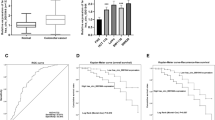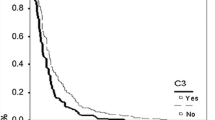Abstract
Purpose
The aim of this study was to evaluate the prevalence and clinical significance of caspase-10 mRNA expression in stage II colorectal cancer.
Methods
Quantitative real-time reverse transcription-polymerase chain reaction (RT-PCR) was used to analyze caspase-10 expression in cancer tissue and corresponding normal mucosa from 120 patients with stage II colorectal cancer. Variables were analyzed by Chi-square test or Fisher’s exact test. Survival was evaluated with method of Kaplan–Meier. Multivariate analysis was performed with Cox’s proportional hazards model.
Results
The expression of caspase-10 mRNA was found to be downregulated in cancer tissue compared to normal mucosa (P = 0.001). Poorly differentiated cancer showed lower mRNA expression than cancer with greater differentiation (P = 0.031). Univariate survival curves, estimated using the method of Kaplan–Meier, defined a significant association between caspase-10 expression and both overall survival (P = 0.012) and disease-free survival (P = 0.021). A multivariate analysis, performed by Cox’s proportional hazards regression model, confirmed that a low caspase-10 expression was the only significant factor to predict poor prognosis in patients with stage II colorectal cancer.
Conclusion
Our data indicate that caspase-10 expression, measured by quantitative real-time RT-PCR, is a possible prognostic factor in patients with stage II colorectal cancer.


Similar content being viewed by others
References
Parkin DM, Bray F, Ferlay J, Pisani P (2002) Global cancer statistics, 2002. CA Cancer J Clin 55:74–108
Jemal A, Siegel R, Xu J, Ward E (2010) Cancer statistics, 2010. CA Cancer J Clin 60:277–300
Sobin LH, Wittekin CH (1999) UICC TNM classification of malignant tumors, 5th edn. Wiley-Liss, New York
NIH Consensus Conference (1990) Adjuvant therapy for patients with colon and rectal cancer. JAMA 264(11):1444–1450
Riethmuller G, Schneider-Gadicke E, Schlimok G et al (1994) Randomised trial of monoclonal antibody for adjuvant therapy of resected Dukes’ C colorectal carcinoma. German Cancer Aid 17-1A Study Group. Lancet 343:1177–1183
Moertel CG, Fleming TR, Macdonald JS et al (1995) Fluorouracil plus levamisole as effective adjuvant therapy after resection of stage III colon carcinoma: a final report. Ann Intern Med 122:321–326
Dube S, Heyen F, Jenicek M (1997) Adjuvant chemotherapy in colorectal carcinoma: results of a meta-analysis. Dis Colon Rectum 40:35–41
O’Connell MJ, Mailliard JA, Kahn MJ et al (1997) Controlled trial of fluorouracil and low-dose leucovorin given for 6 months as postoperative adjuvant therapy for colon cancer. J Clin Oncol 15:246–250
Mamounas E, Wieand S, Wolmark N et al (1999) Comparative efficacy of adjuvant chemotherapy in patients with Dukes’ B versus Dukes’ C colon cancer: results from four National Surgical Adjuvant Breast and Bowel Project adjuvant studies (C-01, C-02, C-03, and C-04). J Clin Oncol 17:1349–1355
Glimelius B, Dahl O, Cedermark B et al (2005) Adjuvant chemotherapy in colorectal cancer: a joint analysis of randomised trials by the Nordic Gastrointestinal Tumour Adjuvant Therapy Group. Acta Oncol 44:904–912
Schrag D, Rifas-Shiman S, Saltz L, Bach PB, Begg CB (2002) Adjuvant chemotherapy use for Medicare beneficiaries with stage II colon cancer. J Clin Oncol 20:3999–4005
Gill S, Loprinzi CL, Sargent DJ et al (2004) Pooled analysis of fluorouracil-based adjuvant therapy for stage II and III colon cancer: who benefits and by how much? J Clin Oncol 22:1797–1806
Sjostrom J, Bergh J (2001) How apoptosis is regulated, and what goes wrong in cancer. BMJ 322:1538–1539
Wong BC, Zhu GH, Lam SK (1999) Aspirin induced apoptosis in gastric cancer cells. Biomed Pharmacother 53:315–318
Thornberry NA, Lazebnik Y (1998) Caspases: enemies within. Science 281:1312–1316
Ghavami S, Hashemi M, Ande SR et al (2009) Apoptosis and cancer: mutations within caspase genes. J Med Genet 46:497–510
Shen XG, Wang C, Li Y et al (2010) Downregulation of caspase-9 is a frequent event in patients with stage II colorectal cancer and correlates with poor clinical outcome. Colorectal Dis 12:1213–1218
Dydensborg AB, Herring E, Auclair J, Tremblay E, Beaulieu JF (2006) Normalizing genes for quantitative RT-PCR in differentiating human intestinal epithelial cells and adenocarcinomas of the colon. Am J Physiol Gastrointest Liver Physiol 290:G1067–G1074
Mygind T, Birkelund S, Birkebaek NH, Ostergaard L, Jensen JS, Christiansen G (2002) Determination of PCR efficiency in chelex-100 purified clinical samples and comparison of real-time quantitative PCR and conventional PCR for detection of Chlamydia pneumoniae. BMC Microbiol 2:17
Pfaffl MW (2001) A new mathematical model for relative quantification in real-time RT-PCR. Nucleic Acids Res 29:e45
Pfaffl MW, Horgan GW, Dempfle L (2002) Relative expression software tool (REST) for group-wise comparison and statistical analysis of relative expression results in real-time PCR. Nucleic Acids Res 30:e36
Shibata D, Reale MA, Lavin P et al (1996) The DCC protein and prognosis in colorectal cancer. N Engl J Med 335:1727–1732
Zaniboni A, Labianca R (2004) Adjuvant therapy for stage II colon cancer: an elephant in the living room? Ann Oncol 15:1310–1318
Comoglio PM, Boccaccio C (2001) Scatter factors and invasive growth. Semin Cancer Biol 11:153–165
Wong CW, Lee A, Shientag L et al (2001) Apoptosis: an early event in metastatic inefficiency. Cancer Res 61:333–338
Fernandes-Alnemri T, Armstrong RC, Krebs J et al (1996) In vitro activation of CPP32 and Mch3 by Mch4, a novel human apoptotic cysteine protease containing two FADD-like domains. Proc Natl Acad Sci USA 93:7464–7469
Grenet J, Teitz T, Wei T, Valentine V, Kidd VJ (1999) Structure and chromosome localization of the human CASP8 gene. Gene 226:225–232
Xu B, Zhou ZG, Li Y et al (2008) Clinicopathological significance of caspase-8 and caspase-10 expression in rectal cancer. Oncology 74:229–236
Engels IH, Totzke G, Fischer U, Schulze-Osthoff K, Janicke RU (2005) Caspase-10 sensitizes breast carcinoma cells to TRAIL-induced but not tumor necrosis factor-induced apoptosis in a caspase-3-dependent manner. Mol Cell Biol 25:2808–2818
Shin MS, Kim HS, Kang CS et al (2002) Inactivating mutations of CASP10 gene in non-Hodgkin lymphomas. Blood 99:4094–4099
Park WS, Lee JH, Shin MS et al (2002) Inactivating mutations of the caspase-10 gene in gastric cancer. Oncogene 21:2919–2925
Kischkel FC, Lawrence DA, Tinel A et al (2001) Death receptor recruitment of endogenous caspase-10 and apoptosis initiation in the absence of caspase-8. J Biol Chem 276:46639–46646
Fong PY, Xue WC, Ngan HY et al (2006) Caspase activity is downregulated in choriocarcinoma: a cDNA array differential expression study. J Clin Pathol 59:179–183
Harada K, Toyooka S, Shivapurkar N et al (2002) Deregulation of caspase 8 and 10 expression in pediatric tumors and cell lines. Cancer Res 62:5897–5901
Wang J, Chun HJ, Wong W, Spencer DM, Lenardo MJ (2001) Caspase-10 is an initiator caspase in death receptor signaling. Proc Natl Acad Sci USA 98:13884–13888
Li J, Chen P, Sinogeeva N et al (2002) Arsenic trioxide promotes histone H3 phosphoacetylation at the chromatin of CASPASE-10 in acute promyelocytic leukemia cells. J Biol Chem 277:49504–49510
Hopkins-Donaldson S, Bodmer JL, Bourloud KB, Brognara CB, Tschopp J, Gross N (2000) Loss of caspase-8 expression in highly malignant human neuroblastoma cells correlates with resistance to tumor necrosis factor-related apoptosis-inducing ligand-induced apoptosis. Cancer Res 60:4315–4519
Kolenko V, Uzzo RG, Bukowski R et al (1999) Dead or dying: necrosis versus apoptosis in caspase-deficient human renal cell carcinoma. Cancer Res 59:2838–2842
Giotakis J, Gomatos IP, Alevizos L et al (2010) Bax, cytochrome c, and caspase-8 staining in parotid cancer patients: markers of susceptibility in radiotherapy? Otolaryngol Head Neck Surg 142:605–611
Pingoud-Meier C, Lang D, Janss AJ et al (2003) Loss of caspase-8 protein expression correlates with unfavorable survival outcome in childhood medulloblastoma. Clin Cancer Res 9:6401–6409
Fulda S, Poremba C, Berwanger B et al (2006) Loss of caspase-8 expression does not correlate with MYCN amplification, aggressive disease, or prognosis in neuroblastoma. Cancer Res 66:10016–10023
Acknowledgments
We thank professors Zhou and Wang for guiding this study, the National Key Laboratory of Biotherapy for useful assistance, and the Department of Gastrointestinal Surgery for providing the experimental specimens. This work was supported by the National Natural Science Founding of China, No. 30801331.
Conflict of interest
The authors declare that they have no conflict of interest.
Author information
Authors and Affiliations
Corresponding author
Rights and permissions
About this article
Cite this article
Shen, XG., Wang, C., Li, Y. et al. Downregulation of caspase-10 predicting poor survival after resection of stage II colorectal cancer. Int J Colorectal Dis 26, 1519–1524 (2011). https://doi.org/10.1007/s00384-011-1239-z
Accepted:
Published:
Issue Date:
DOI: https://doi.org/10.1007/s00384-011-1239-z




